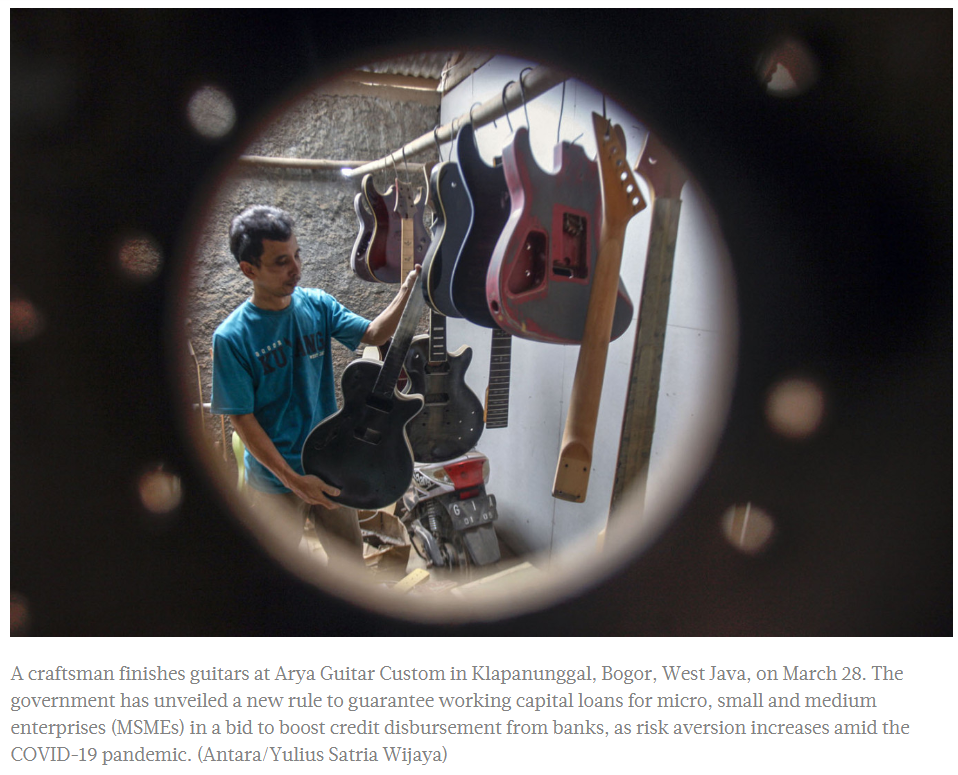Indonesia: Government unveils new rule to guarantee loans for MSMEs as risk aversion rises
The government has unveiled a new rule to guarantee working capital loans for micro, small and medium enterprises (MSMEs) in a bid to boost credit disbursement from banks, as risk aversion increases amid the COVID-19 pandemic.
Finance Ministry Regulation (PMK) No. 71/2020 published on Monday stipulates that the government will assign state-owned credit insurer Jaminan Kredit Indonesia (Jamkrindo) and state-owned insurer Asuransi Kredit Indonesia (Askrindo) to provide guarantees for banks to channel loans to MSMEs.
The government has allocated Rp 12 trillion (US$839.07 million) to guarantee working capital loans, which consists of Rp 10 trillion for guarantee services and another Rp 2 trillion in reserves.
Finance Minister Sri Mulyani Indrawati said the government would soon implement the insurance scheme, adding that the policy aimed at pushing banks to channel more loans to MSMEs whose businesses have been heavily disrupted by the pandemic.
“We are introducing risk management for new working capital loans so that banks feel safe to lend again and companies feel protected as the government will pay the insurance for them,” she told a discussion on Monday, warning that risk aversion might further delay the economic recovery.
“Risk aversion is exactly what is happening now as banks and businesses do not want to restart the working capital disbursement after debt restructuring,” Sri Mulyani went on to say. “The economy will not grow if they wait for all the restructuring processes to be completed, which will take months.”
The government has been struggling to keep the economic wheels turning since the COVID-19 outbreak forced people to stay at home to contain the coronavirus spread. It has started to gradually reopen the economy despite an increase in the number of cases as the economy is expected to grow by just 1 percent this year under the baseline scenario or even contract by 0.4 percent under the worst-case scenario.
The government has allocated Rp 695.2 trillion to fight the health and economic impacts of the pandemic, of which Rp 87.55 trillion will be allocated to health care, Rp 203.9 trillion to strengthening social safety nets and Rp 123.46 trillion to incentives for MSMEs, among other measures.
The PMK also outlines several criteria for banks to receive the state guarantees, such as they must have a good reputation, be considered healthy by the Financial Services Authority (OJK) and bear a minimum of 20 percent risk from providing the working capital loans.
The government has also put in place several criteria for MSMEs to be eligible to get the state guarantees, such as a good credit record and a proposed maximum loan value of Rp 10 billion.
“We used to have 12 percent credit growth [annually] but what I have now is only 3 to 4 percent. It’s lucky enough to even have positive credit growth,” Sri Mulyani said, adding that the growth was driven by loans to the healthcare, as well as food and beverages, segments.
Indonesia’s loan growth slowed to 5.7 percent year-on-year (yoy) in April from the 7.9 percent annual growth recorded in March, Bank Indonesia (BI) data show, as the pandemic discouraged loan demand amid disrupted business activity. At the same time, some borrowers have been facing difficulties in repaying their loans.
OJK data show that Indonesian banks had provided 6.35 million borrowers with credit restructuring worth Rp 695.3 trillion as of June 22, following the issuance of OJK Regulation No. 11/2020, which instructed financial institutions to provide relief for borrowers affected by the COVID-19 pandemic.
“Credit restructuring has grown significantly in banks in the BUKU IV [category], with the highest growth recorded in the trade sector,” OJK chairman Wimboh Santoso told lawmakers in a hearing on Monday. “We will ask banks to start providing loans for borrowers again.”
As part of its efforts to boost loan channeling, the government announced last week that it would place Rp 30 trillion in state-owned banks, associated under the auspices of Himbara, to be disbursed as loans to businesses to help support economic recovery.
The government is following through on its promise to allocate fund placements in banks worth Rp 82.2 trillion to help their liquidity as they conduct credit restructuring for MSMEs and labor-intensive businesses affected by the pandemic.
The fund placement and the working capital loan guarantee are part of the government’s Rp 695.2 trillion budget to mitigate the impact of COVID-19.
Source: https://www.thejakartapost.com/news/2020/06/30/government-unveils-new-rule-to-guarantee-loans-for-msmes-as-risk-aversion-rises.html


 English
English




